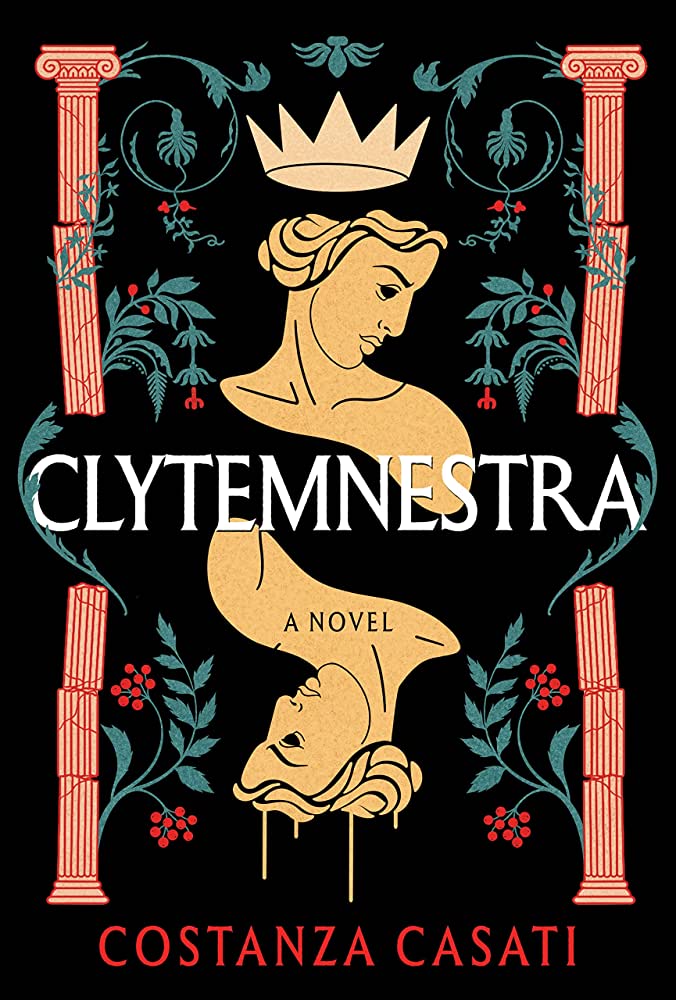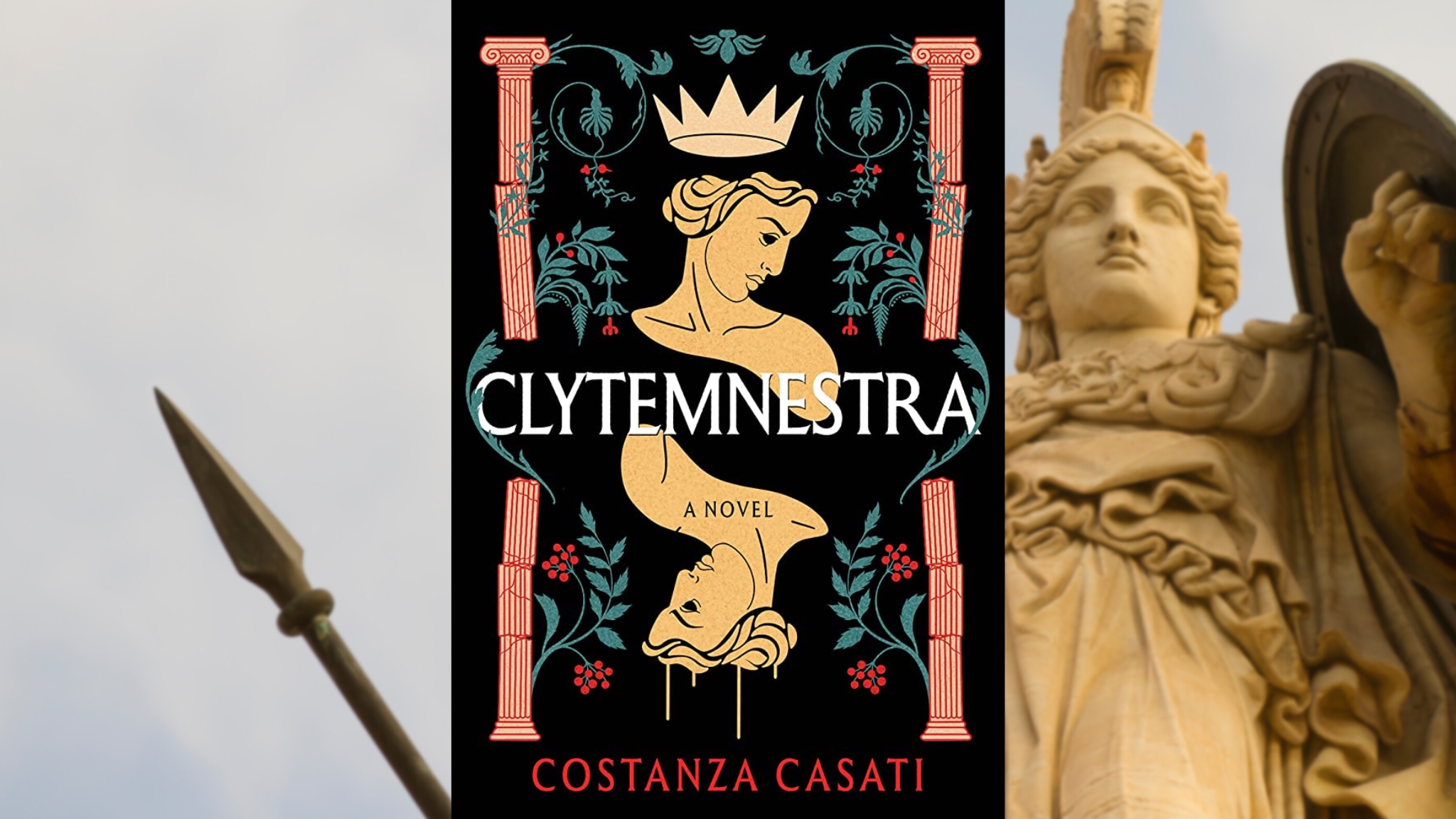Clytemnestra by Costanza Casati
Kings tend to become heroes to future generations. Heracles, Perseus, Jason, Theseus … songs about them are sung, and their cruel deeds are turned into sunlight.
As for queens, they are either hated or forgotten.
Perhaps my favorite trend in recent years is the growing need for authors to give voice to the silenced women of Greek mythology. There are quite a lot of them, from mortals like Helen and Briseis to the monstrous Circe and Medusa. Costanza Casati contributes a mesmerizing addition to this trend in her debut novel, Clytemnestra (Sourcebooks), which recounts a breathtaking story of love and vengeance through the eyes of ancient Greece’s most notorious heroine.
Strong-Willed Princess
As a princess of Sparta, Clytemnestra had a relatively happy childhood — despite being surrounded by blood and death from an early age. She was her father’s favorite, respected by her two older brothers and revered by her younger sisters. Brave and strong, and willing to dirty her hands protecting her loved ones, she seemed the exact opposite of her delicate, beautiful twin sister, Helen.
As a woman of Sparta, she was able to choose her own husband, and when a kind and adventurous foreign king graced their palace, she fell in love. She envisioned nothing but a happy future surrounded by those she loved.
Until the Atreidi — Menelaus and Agamemnon — arrive, and Clytemnestra’s world starts to crumble. Helen makes the short-sighted and ill-advised decision to marry Menelaus, practically severing the sisters’ weakening bond. Soon after, everything is taken from Clytemnestra by the hands of the cruel Agamemnon — in league with her own father! — in a plot to secure her hand in marriage.
Clytemnestra is left broken and hollow, like a bird with crushed wings, and the first seeds of hatred take root.
Rotten, Villainous Queen
Taken from her family to rule alongside Agamemnon as Queen of Mycenae, Clytemnestra buries her rage, letting it fester as the years pass.
But fate is forever unkind to this family — the cursed Atreus line — and when Agamemnon must make a sacrifice to sail for Troy, Clytemnestra is the one who pays. There is no going back as the winds carry the Greeks to war and Clytemnestra takes on the role of ruler, embarking down a path of hate and vengeance.
“Pray to the gods,” everyone kept telling her … But you don’t get rid of a rat by praying to the gods.
You’ll find yourself sweating in anticipation for the ending — and trust me, Casati does not disappoint.
Women’s Righteous Fury
Part of what I love so much about this book was Clytemnestra’s slow descent into hatred. “Hate is a bad root,” her mother tells her. “It takes its place in your heart and it grows and grows, letting everything rot.” And boy, did I enjoy watching her rot!
The ancient Greeks loved to paint women as the villain, yet Casati so perfectly captures the righteous indignation and fury so many women throughout history have faced. Here is a woman who has continuously been attacked and made to feel powerless by the men around her, and yet she continues to not only defy them, but actively fight back and ultimately win.
Yet Clytemnestra isn’t the only strong woman within the novel. Her sisters showcase their own unique kinds of strength: Timandra’s rebellious independence and Helen’s subtle cunning. Her cousin, Penelope, bears a silent, graceful wisdom. Even her mother, Leda, who ultimately fails her children, once held an unbreakable spirit like Clytemnestra.
Casati’s expertise in ancient Greece shines through not only in her language and in-depth world-building, but also in her assortment of characters. It’s the addition of these complex characters, and others, that help the story feel whole.
What’s Left After Vengeance?
While Clytemnestra’s story is heavily influenced by hate and vengeance, I would be remiss to exclude her abundance of love. Love for her children, her siblings, and her lovers. In the end, it is this love that keeps her going.
For a long time, hatred sustained her.
For each painful memory, a thought of revenge. It is as if she keeps burning herself, then plunges her arm into freezing water to keep the pain at bay … slowly, those thoughts healed her, as much as one so broken can be healed.
But after exacting revenge, what else can keep a person going? How does a broken person fully recover and move on? The answer is simple — love.
 About Costanza Casati:
About Costanza Casati:
Costanza Casati was born in Texas in 1995, grew up in a village in Northern Italy and lived in the UK for five years. Before moving to London, she attended a classical Liceo in Italy, where she studied Ancient Greek, and Ancient Greek literature, for five years. Costanza is a graduate of the Warwick Writing MA programme, where she studied under Sarah Moss, and currently works as a freelance journalist and screenwriter. She is passionate about ancient history and wants to make its heroines accessible to the present.




